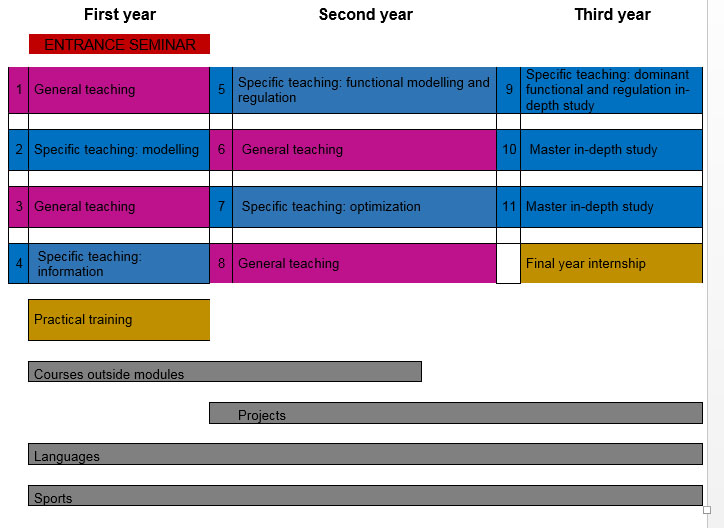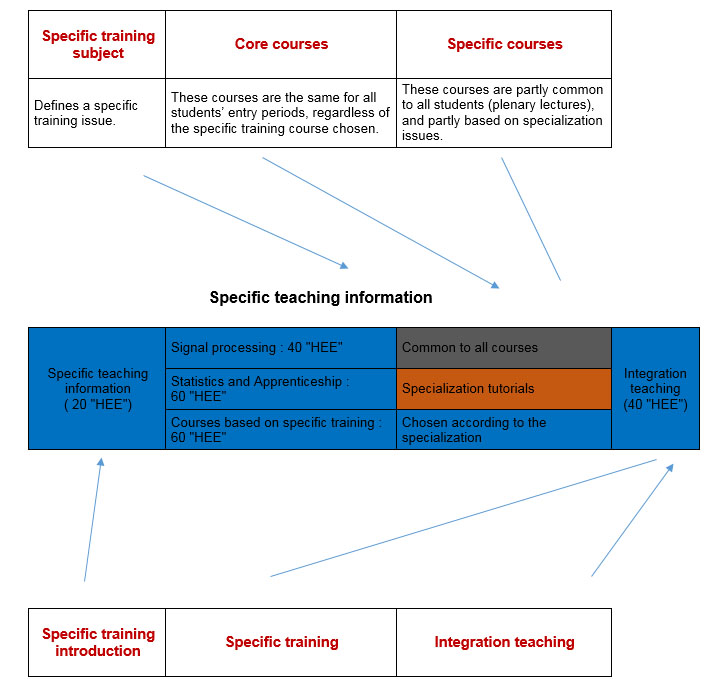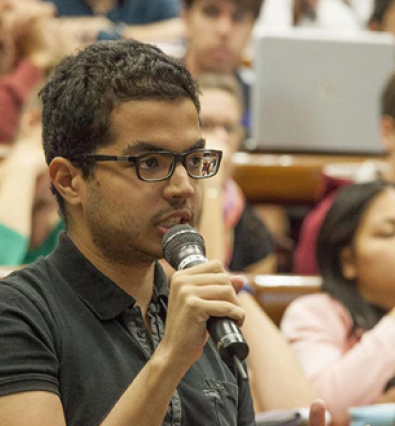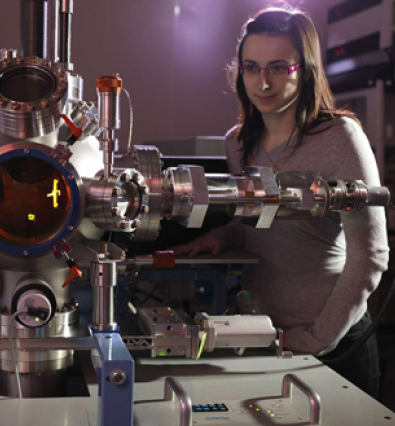The three-year curriculum is taught in the following framework:

Between these modules, time is devoted to professional projects.
The curriculum is scheduled in eight-week sequences as follows:
Engineering Challenge Terms (eight weeks):
Specific training focuses on an engineering project and combines theoretical knowledge, methodological inputs and integration teaching (solving a concrete problem identified by an industrial partner) in a specific field. The curriculum includes four specific training courses in the first two years, and one during the final year. The first four specific training courses focus on a topic concerning the processing of a complex problem: modelling, information, regulation and functional modelling, and optimization.
-
For more information, click below on "specific training: definition" (at the end of the page).
Academic Terms
More traditional teaching includes a range of courses, often elective. These courses foster personal development, interdisciplinary and multicultural skills in a variety of fields and enable the students to gain or improve knowledge in certain study areas.
- For more information, click below on "first and second year elective modules".
Sandwich weeks
Short intensive periods are devoted to professional projects (entrepreneurship week, corporate games and project weeks), or to specialization (third year).
Semester-long courses
Courses outside modules include a wide range of courses that:
- are unsuited to a rapid pace (allowing enhanced methods),
- must be completed by the whole class but which are not covered by specific
training courses or projects.
- For more information, click below on "general teaching".
Projects
Projects of ranging durations play a crucial role in the curriculum. Their objectives are always in line with scientific, industrial and socio-economic customer requirements.
Three types of projects are proposed:
- Type I: Projects related to taught subjects,
- Type II: Short-term projects to understand the project process and achieve a simple implementation,
- Type III: Long-term projects, aiming at a challenging achievement, an identified value.
Specific training: Definition
A specific training course focuses on a particular engineering project and includes the following components:

Specific training
An "HEE" equals one hour spent by a student during the curriculum: homework, exercises, individual or collective work, project, video viewing in a flipped classroom, etc. This gives student engineers the opportunity to:
- iscover industrial fields and career opportunities from the first year and thus be guided in their personal project (this choice has to be made during the third year),
- Simultaneously complete general training (choosing a thematic training course is not binding for the rest of the curriculum.),
- Implement theoretical knowledge on a specific subject, understand that knowledge is workable and that different subject areas must be combined to solve engineering problems.
During each thematic training course, several topics are proposed (generally one topic per major output sector). Examples of topics offered in a thematic training course:
|
|
||
|
|
First-year elective modules
During the first year, students must choose four out of nine elective modules in “Science for engineers”:
- Electromagnetic systems
- Electrical energy
- Industrial engineering
- Continuum mechanics
- Network security
- Transfer sciences
- Electronic systems
Second-year elective modules
During the second year, many elective modules are proposed, in various disciplines, on our three campuses.
AUTOMATION
- Dynamic systems in neuroscience
- Interactive systems and robotic systems
- Multi-agent dynamic systems analysis, Optimization and coordination - Drones
ELECTROMAGNETISM
- Human exposure to electromagnetism and electromagnetic compatibility
- Electromagnetic modelling of complex systems and antennae
ENERGY & ENERGETICS
- Renewable energies
- Energy conversion
- Thermal transfer
- Fluid mechanics
- Nuclear engineering
- Reactive environments
MATHEMATICS
- Software engineering, C++/Java
- IT theory
- High performance computing
- Big data management
- Web and mobile applications design
- Artificial intelligence
- Cloud computing and distributed computing
- Advanced probability
- Distributors and operators
- Machine learning
- Algebra and cryptology
- Advanced statistics
- Scientific calculation
MECHANICS & CIVIL ENGINEERING
- Structural vibrations and acoustics
- Living materials
- Non-linearity in materials
- Advanced mechanics in civil engineering
- Coupled multi-physics simulations
PHYSICS
- Fundamental laws of the Universe: Particle physics, Astroparticle physics and cosmology
- Quantum and statistical physics (Part II)
PROCESSES
- Understanding, optimizing and simulating biotechnological processes
- Physics of finely-divided materials
- Genomics and synthetic biology in human health and in industrial
- Engineering processes dedicated to sustainable development
CORPORATE MANAGEMENT
- Marketing strategy and organisation
- Innovation and growth economy
- Operations and supply chain management
- International economics
- Innovation management and entrepreneurship
- Corporate finance, law/finance and corporate law
- Systems engineering
- Internet of Things: from concept to prototype
- Complex project management
- Design science
SIGNALS & STATISTICS
- Signal processing
- Digital image processing
ELECTRONIC SYSTEMS
- Digital system architecture and design
- From transistors to complex analogue signals
- Embedded sensors for the Internet of Things and smart networks (with electro-magnetism)
TELECOMMUNICATIONS
- Communication theory
- Cellular networks and services
- Statistical physics applications to information processing
HUMAN & SOCIAL SCIENCES
- Employees, work and organizations
- Societal issues
- Science, technology, civil society
- Innovation, arts and creativity
E-LEARNING ELECTIVE MODULES
- Procurement management (Business Management Department)
- Blockchain (IT Department)
METZ CAMPUS
- Introduction to mobile application engineering
- Introduction to service-based applications development
- Elegant coding C++
- Big Data: cluster and cloud data collection, storage and analysis
- Estimating methods and introduction to current coding theory
- Audio data analysis and processing (speech and music)
- Digital image processing
- Robust embedded electronic and IT systems
- Complex electronic system design: from component to mixed system
- From atoms to electronic components
- Light and materials science
- Smart photonics systems
- Chaos, fractals and complexity
RENNES CAMPUS
- Model-based design of embedded control systems
- Calculator architecture
- Operating systems
- System programming in Linux and Windows
- Modelica and bond graph: multi-field modelling, analysis and simulation
- Serious games
- Virtual reality and augmented reality
- Digital methods
- Artificial intelligence and deep learning
- Compression-protection and information processing
- New network paradigms
- Embedded systems and the Internet of Things
- Predictive-based models
Core courses
Throughout their curriculum, students will have mandatory courses:
First year:
- Information systems and coding
- Measures, integration, probabilities, partial differential equations
- Statistics and learning
- Statistical and quantum physics
- Algorithm analysis
- Signal processing
- Corporate finance
Second year:
- Automation and control engineering
- Modelling systems
- Mathematical optimization
- Sociology of organizations
Focus on projects
Focus on projects
- First and second years include Type I projects such as "coding week" covering implementation of a software engineering project together with courses or integration projects for specific teaching courses.
- Project Type II is completed during the first year (Semester 6). Students must work on a project to achieve a "trusted" outcome. The objective in a simple technical project is to learn about and practice project teamwork.
- During the second year, students must enhance their project-based approach and implement it to achieve meaningful deliverables through Type III innovation projects. The objective is to work over time to acquire the skills needed to manage and deliver an attractive project.
- During the third year, the professional project, Type III, is advanced in a more professional environment and is strongly supported by specializations. The goal is to achieve a project outcome that can be promoted in a professional or research environment.




